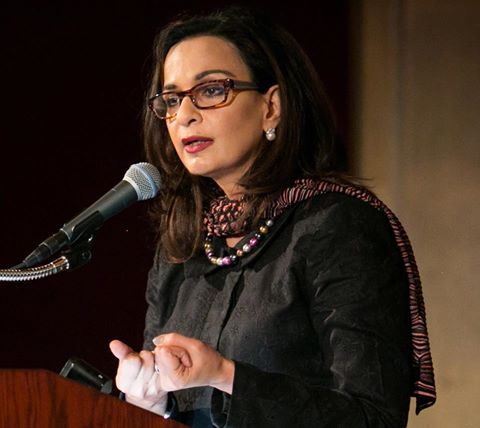
ISLAMABAD, March 21, 2020: While advocating policy responses for first-order actions on COVID-19 pandemic that seems to be burning through the country, PPP Parliamentary Leader in Senate, Senator Sherry Rehman urged quick actions given the time-sensitive nature of scaling down the magnitude of the threat to Pakistan as a whole. She said that, “Governments and citizens must take Bilawal Bhutto Zardari’s advice in practicing and promoting self-isolation, which requires strong leadership in temporarily suspending our social norms that are rooted in social congregations. Lessons from other countries must not be ignored in losing time, as the virus moves with stealth and speed. The issue of voluntary and other lockdown options must not be taken lightly, because lives have to be saved first, which means that only essential services should remain open, and immediate financial support lifelines be created for daily wage-earners and small businesses that will suffer in such an emergency. Though this will be economically tough, this tough choice has to be made as we have to save lives first, and we must do whatever it takes.”
Addressing again the very real problems of distancing for daily wage workers and vulnerable communities, Senator Rehman said that, “Daily wage earners get no sick leave and many are homeless. After diverting budgets to higher BISP, an appeal should be made to philanthropists to help with rations for vulnerable families. Funds and resources for ration stores must be created, as during a war when food supply chains get interrupted. We cannot leave our people at the mercy of the market, as 40 percent of our population lives in poverty, and rural populations are already food insecure. A re-imagining of resource distribution and allocation is critical, as the existing economic paradigm cannot feed and secure a huge number of people without access to clean water, let alone health services. If lead ministries can’t handle this then emergency task force should be created”.
Urging momentum on a national action plan that pivots on daily coordination at the highest levels with all the provinces, she said that testing for the coronavirus is essential as cases flood into hospitals. Given the status of our health care system in proportion to population and its potential testing, quarantine care, hospital beds and even ventilator needs, she urged prioritisation of the health infrastructure immediately. “It is important that test kits and ventilators are urgently imported. As this will take time, they should be ordered now and the procurement procedures fast-tracked. Initially, only Sindh government was quick to import 10,000 testing kits. The WHO has already stressed upon the importance of testing people, and this cannot be ignored”.
She said, “In order to flatten the curve, testing and quarantines are essential after social distancing. While WHO recommends five hospital beds per 1,000 population, Pakistan’s hospital bed-to-population ratio is less than one per 1,000; in fact, the bed occupancy rate is over 100pc”. While commending Sindh government efforts in taking the lead on this, she also asked other governments to prioritise the safety needs of health professionals and provide them with protective gear. They are the frontline in this campaign, and we salute their courage and sense of duty, but we must give them the safety they need to work through the crisis.”
Senator Rehman praised Sindh and KP government for their efforts and said, “Other provinces should get on with testing and transparency. Messaging for safety is crucial and federal government should run nonstop social distancing and hygiene advice. Ulemas need to use the pulpit and learn from other Muslim countries and encourage people to start praying at home. Other Muslim countries are making the rules to protect their people. We must too, as distancing cannot be left as a voluntary effort only”.
“Chairman PPP, Bilawal Bhutto Zardari’s lead should be followed where all health professionals out of the system should be requested to return to duty along with a new cadre of volunteers. This is a national war effort and let us treat it as that. A prevention plan should be made and the federal government should get in touch daily at a designated time on video conference with all provinces for first and second -order emergencies”, the Senator added.
Senator Rehman said, “Helplines need more staff, and that staff needs training. Private sector doctors are available for training, counselling and advice. This is not an easy task so at least one non-emergency ministry should be directed to just collating, collecting health professionals and paramedics online”.
“Despite the reduced load of flights, airport screening still has to continue and if that is not possible then minimise the load at borders. CAA and FIA can start training staff to improve core vigilance and for this a Border Health Task Force led by a technical health professional to avoid mistakes should be immediately set up”, Rehman added.
Highlighting the deteriorating state of our healthcare system, the Senator stated that, “Pakistan’s federal health budget of Rs 13,897 million has to be grown from less than 1 % of federal budget of Rs 4,780,358 million so procurements, imports, emergency health expenditures should stay with lead ministry. Same should be with the provinces which need exponential expansion in testing and quarantine help”.
Senator Sherry Rehman concluded by saying that many more steps will be needed to fight this unprecedented challenge. “No government can fight a pandemic alone. Let us treat this as a national emergency, where government sets up immediate platforms for transparent aid-gathering and disbursal to our most risk-prone populations. Rations, water, energy can all be costed down. Multilateral aid is also forthcoming, which must be distributed evenly between the provinces. Communities are waiting to be mobilised for assistance, but need clear messaging. Water, for instance, is key to life-saving and anyone with a waterline can set up a basic water faucet/sink and water dispenser for water-deprived families and individuals outside their homes”.

